Charlie Hebdo mocks Tehran over singer detained for hijab protest
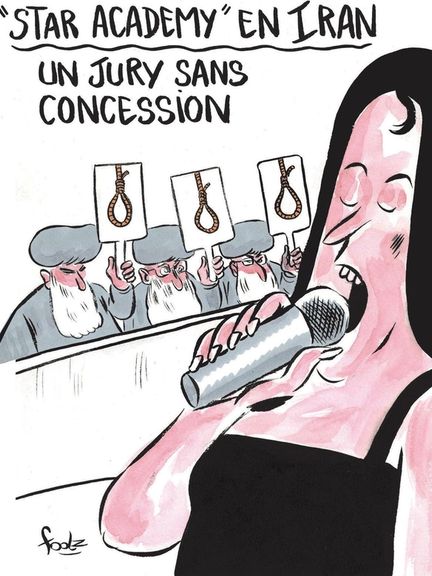
French satirical magazine Charlie Hebdo has published a cartoon lampooning Iran's clerical rulers for briefly jailing Iranian singer Parastoo Ahmadi over an unveiled online concert.

French satirical magazine Charlie Hebdo has published a cartoon lampooning Iran's clerical rulers for briefly jailing Iranian singer Parastoo Ahmadi over an unveiled online concert.
The French magazine has often produced satirical content about the government in Iran.
Last year, it launched an international competition titled "Mullahs Get Out" to create caricatures of Iran's Ali Khamenei, whom it described as a “symbol of backward-looking, narrow-minded, intolerant religious power.”
Tweet unavailable
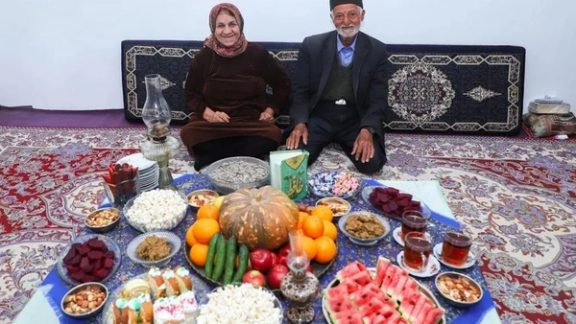
Millions of Iranian families will celebrate the ancient Winter Solstice festival on Friday evening, though many have scaled back their budgets for the occasion, with businesses reporting a notable drop in sales.
Yalda Night, or Shab-e Chelleh, marks the longest night of the year and is one of the most significant events on the Iranian calendar. Similar to Nowruz, the celebration of the Spring Equinox and the Iranian New Year, Yalda's origins trace back to at least the Achaemenid era (circa 500 BC). The word "Yalda," however, is derived from ancient Syriac and means "birthday."
The celebration of Yalda, like Christmas, is an important family event celebrated with special foods, fruits such as watermelons and pomegranates, nuts and dried fruits, candles, poetry reading, games, and song and dance.
To ancient Iranians, the night of the Winter Solstice was the eve of the birth of the God of light and love, Mithra. On this night, they believed, Light defeated the powers of Darkness, and the sun gained its power again to make days longer and bring about the rebirth of nature at Spring Equinox.
President Masoud Pezeshkian who has been on a visit to Cairo, sent a special message to Iranians on Thursday to congratulate for Yalda. “We Iranians believe that Yalda will bring light [after long days of darkness]," he wrote in his message.
Alireza Arzani, an official with Iran's Chamber of Guilds, stated Wednesday that while the prices of food and items essential for Yalda celebrations have remained relatively stable compared to last year, people's purchasing power has dropped by around 50% during the same period, leaving many businesses struggling.

Arzani, representing nut and dried fruit retailers at the Chamber of Guilds, explained that declining demand has compelled retailers to reduce profit margins and lower prices in an effort to clear stock typically sold during this season.
Tejarat News, an economic newspaper, estimates that a family of four would need to spend approximately 25 million rials (around $30) for a modest Yalda spread this year. This amount represents 20-25% of the average monthly income for most Iranian workers and civil servants.
Iran's hardline Shiite clerical establishment frowns upon pre-Islamic celebrations, viewing them as remnants of paganism. However, the deep-rooted traditions of the Iranian people have largely thwarted their efforts over the past four decades to diminish the significance of ancient festivals in favor of Islamic ones.
Most Iranians find no contradiction in celebrating both ancient festivals and Islamic occasions. Each year, they send tens of millions of text messages to mark the Winter Solstice, much like they do during Nowruz. Similarly, a minority of devout individuals exchange greetings on religious occasions, such as the birthdays of Prophet Muhammad and the first Shiite Imam, Ali ibn Abi Talib.
In 2023, Iran's Supreme Council of Cultural Revolution (SCCR) renamed some calendar events including Yalda which they designated as the "Day of Promotion of the Culture of Hosting and Connecting with Relatives”.
Many of the members of SCCR are appointees of Supreme Leader Ali Khamenei. The Council is mandated with ensuring that non-Islamic cultural influences and ideologies are defused, and education and culture comply with values prescribed by the religious establishment and the state.
The public reacted very negatively to the SCCR’s move. In defiance of what they saw as an attempt to obliterate the country’s pre-Islamic past, many vowed to celebrate the festival with even more vigor. Social media users also posted numerous jokes about the long name proposed for the ancient festival.
The highly negative reaction forced the authorities to backtrack. The state-run television which has a monopoly on broadcasting, and the hardline dominated Tehran municipality, even tried to show an unprecedented interest in honoring Yalda with special programs and decorations installed around Tehran by the municipality. The same trend has continued this year.
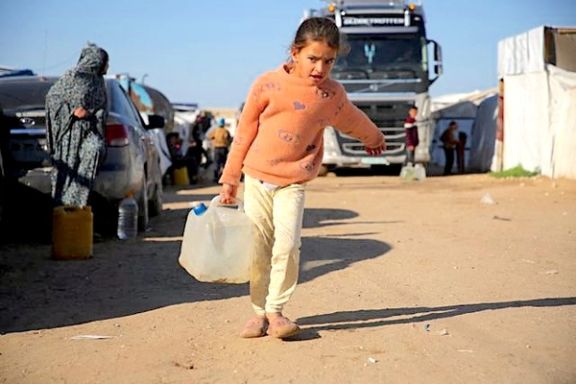
Turkey’s Foreign Minister Hakan Fidan leveled a diplomatic barb at Tehran, saying that Iran’s heavy involvement in Syria failed to protect the people of Gaza from a devastating Israeli incursion.
The criticism underscores the rift between the two Mideast heavyweights just as Ankara has gained more influence after Syrian rebels it supports ousted Iran's main Arab ally, President Bashar al-Assad.
"With all due respect to our Iranian friends, I mean, we’ve had this discussion maybe 1,000 times with them because their presence in Syria didn’t prevent a big genocide in Gaza," Fidan said in an interview with pan-Arab channel Al Jazeera published on Wednesday, referencing remarks made by Iran's Supreme Leader earlier in the week.
In his speech, Ali Khamenei emphasized that Tehran's armed groups, including Hamas and Hezbollah, remain strong despite external challenges. Addressing developments in Gaza, Lebanon, and Syria, Khamenei accused the United States and Israel of underestimating the strength of the Iran-backed resistance movement.
"They thought resistance was over. They are gravely mistaken. The spirit of Seyyed Hassan Nasrallah is alive; the spirit of Sinwar is alive," Khamenei said, referring to Hezbollah and Hamas leaders killed by Israel.
"Their martyrdom has not removed them from existence. Their path continues."
The plight of Gaza is a key issue animating political opinion in the Islamic world but neither Turkey nor Iran have been able to dent Israel's ongoing assault there.
Syria, under Assad, was a key component of Iran’s so-called 'Axis of Resistance,' serving as a vital land corridor for supplying weapons and materiel to Hezbollah in Lebanon. Over the years, Israel sought to disrupt this supply line through hundreds of airstrikes.
Fidan said Iran and Russia had realized their ally Assad was growing weaker.
“The Russians and Iranians have been in Syria a long time, and they know exactly how the Syrian regime has gone in a negative direction. They are very much familiar with the problem of the old Assad regime."
Fidan did not comment on whether any guarantees had been given to Iran or Russia, saying that it is for Syria’s people and government to decide.
In an interview earlier this week, Fidan said that Iran must better understand its actions following Assad’s downfall.
“I think Iran will also learn lessons in the new period; we need to help Iran in a constructive way,” Fidan said in an interview with Saudi-affiliated Al-Hadath on Sunday. He outlined Turkey’s vision for the Middle East as one based on cooperation and respect for sovereignty, adding, “We don’t want Iranian domination, Turkish domination, or Arab domination. It’s time for us to come together and establish our own interests, our own order in the region, shoulder to shoulder.”
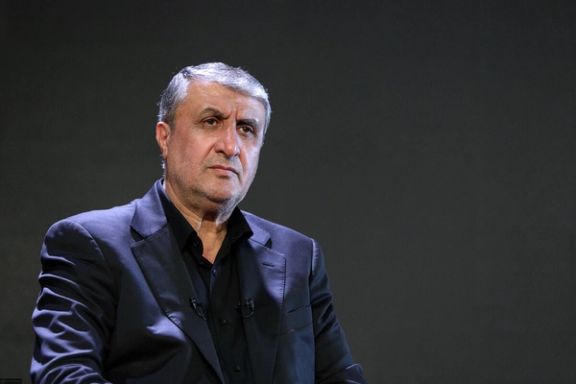
The International Atomic Energy Agency (IAEA) creates obstacles to Iran's use of peaceful nuclear technology due to US pressure, Mohammad Eslami, head of Iran's Atomic Energy Organization, said Thursday.
“The IAEA is obligated to promote, facilitate, and support peaceful nuclear technology so that it is accessible to all nations,” Eslami said during a state TV interview. “They mediate whatever is necessary to enable other countries to provide the technology you need, but when it comes to us, they create obstacles because they are implementing US congressional laws.”
"The sanctions are not aimed at economic goals; rather, they are intended to instill this narrative: 'If you don’t have money, why spend it on nuclear energy?' This is their tactic and tool to pursue their objective of preventing us from obtaining nuclear knowledge," Eslami said regarding sanctions on Iran's nuclear program.
Eslami also criticized the director of the UN nuclear watchdog on Wednesday for making what he described as provocative statements regarding Tehran’s nuclear program. He said that despite Iran accepting limitations on its nuclear activities to build trust and in exchange for the lifting of sanctions, the agency continues to misrepresent Tehran’s efforts.
Rafael Grossi, head of IAEA, said Monday that the 2015 Iran nuclear deal, known as the Joint Comprehensive Plan of Action (JCPOA), is no longer sufficient to curb Tehran’s uranium enrichment, which has exceeded international limits.
"Iran is enriching uranium close to military levels and is rapidly moving towards becoming a nuclear state," Grossi told the ANSA news agency. "The philosophy of the original accord with Iran can be used, but that agreement is no longer useful," he added.
Kazem Gharibabadi, Iran’s deputy foreign minister for legal and international affairs, also responded to Grossi’s remarks, stating, "The Director General of a specialized organization is expected to speak based on facts and technical reports from the Agency's inspectors. Reading intentions based on hypothetical scenarios is not part of the Director General's duties and is contrary to the letter and spirit of the Agency's statute."
On December 6, the IAEA reported that Iran had significantly accelerated its production of 60% enriched uranium, which is now approximately five times higher than a month ago. Iran is believed to possess enough 60% enriched uranium to produce four to five atomic bombs, should it choose to pursue nuclear weapons.
Since the US withdrew from the JCPOA, Iran has breached its nuclear commitments, increasing uranium enrichment to 60%, near weapons-grade levels. Subsequent negotiations with the US and the E3 (France, Germany, and Great Britain) have failed to revive the deal or secure a new agreement. With ten months remaining until the “Termination Day” for UN Resolution 2231, which sealed the JCPOA, the impasse on restoring the nuclear deal continues.
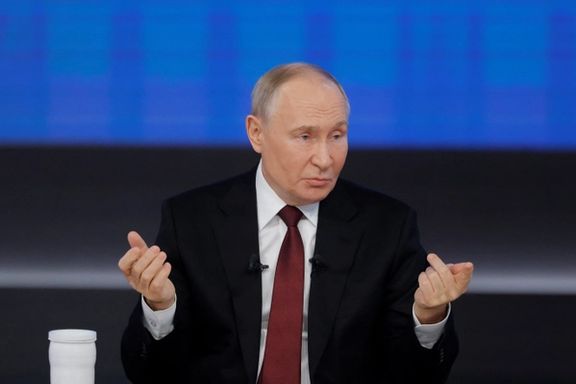
Moscow evacuated 4,000 Iranian soldiers from Syria to Tehran by air after rebels took control of the country, Russian President Vladimir Putin said on Thursday, suggesting Iran depended on Russia to flee the country after it fell to rebels.
Just as Iran had originally requested Russia transport its units to Syria to back now ousted President Bashar al-Assad, Putin said in remarks carried by state media, Tehran again sought Moscow's aid to evacuate the soldiers.
"If earlier, for example, our Iranian friends asked us to help them transport their units to Syrian territory, now they asked us to withdraw them from there," Putin said. "We took 4,000 Iranian fighters to Tehran from the Hmeimim base. Some of the so-called pro-Iranian units left without a fight for Lebanon, some for Iraq."
But a senior commander of Iran’s Revolutionary Guards swiftly denied the claim later on Thursday, marking a rare public disagreement between the two partners in arms.
"A large number of Iranians have been living in Syria for a long time, and Russia relocated most of them to Iran," said Mohammad Jafar Asadi, deputy commander of the Khatam-al Anbiya Central Headquarters, a construction giant.
"These were not Iran's advisory forces; we withdrew our advisory forces from Syria ourselves," he added. "We do not allow Russia to relocate our military forces."
The Islamic Revolutionary Guard Corps (IRGC), a transnational military organization that lies at the heart of Iran's ruling establishment, has been a key ally of Russia in Syria and Ukraine.
Moscow has launched hundreds of IRGC-provided drones at Kyiv's forces while Iranian and Russian troops together fought the Islamist rebels now running Syria after they seized Damascus from President Bashar al-Assad.

Staying in Syria
Putin suggested Russia's decades-old military presence was not set to be upended by Syria's upheaval, even as Iran appeared to have been decisively ejected.
“We maintain contact with all groupings in Syria and all countries in the region. They all say that it would be better if we kept our bases there,” Putin said in his first public comments on the subject.
Putin also said he had not yet met with former Syrian President Bashar al-Assad since his overthrow and subsequent flight to Moscow earlier this month but noted that he planned to do so.
Russia, which intervened in Syria in 2015 and shifted the course of the civil war in Assad's favor, had also informed other countries that they could use its air and naval base to deliver humanitarian aid to Syria, he said.
"You want to portray everything that is happening in Syria as some kind of failure, a defeat for Russia. I assure you, it is not. And I'll tell you why. We came to Syria 10 years ago to prevent a terrorist enclave from being created there," said Putin.
"On the whole, we have achieved our goal. It is not for nothing that today many European countries and the United States want to establish relations with them (Syria's new rulers). If they are terrorist organisations, why are you (the West) going there? So that means they have changed."
His comments come as European Union (EU) nations seek assurances from Syria's new leaders that they will distance themselves from Russia and Iran and work toward a peaceful future for the country after years of civil war.
“Russia and Iran are not your friends, (and) are not helping you if you are in trouble. They left Assad’s regime, and that is a very clear message showing that their hands are full elsewhere and they are weakened,” EU foreign policy chief Kaja Kallas said on Monday, addressing Syria’s new leaders.
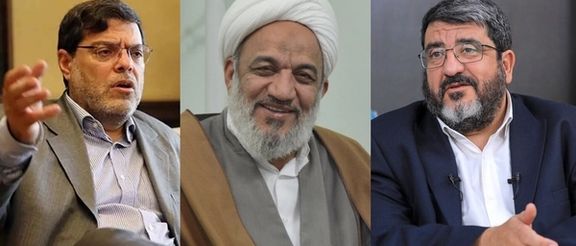
Iranian hardliners who ironically spent time in the United States are responsible for pushing policies which deepen Iran's isolation and weakness, a leading centrist news outlet fulminated this week.
A few of these hardliners, who were born or lived in the United States, have become a particular focus of criticism.
Entekhab wore on Tuesday that several hardliners with US ties—whether born, raised or having resided there—are promoting radical ideas in foreign policy. The paper regarded this as a strange phenomenon that people who benefited from education or experience in the United States are now promoting policies that could increase Iran's isolation.
The website featured images of several individuals with similar backgrounds, including political commentators Foad Izadi and Mohammad Marandi, as well as former Paydari Party leader Morteza Aqa-Tehrani. It further alleged that "all of these hardline figures support ultraconservative former nuclear negotiator Saeed Jalili."
Entekhab quoted Heshmatollah Falahatpisheh, the former head of the Iranian parliament's Foreign Relations and National Security Committee, criticizing Iranian ultraconservative academic Foad Izadi. Falahatpisheh remarked, "Izadi grew up, attended school, and lived in the United States for several decades. Yet, upon returning to Iran, he was appointed as a university faculty member and introduced on state television as a political expert on the United States. In all the programs he has participated in, he has done nothing but promote international tensions. Isn't there something wrong here?"
According to Entekhab, Izadi is a member of the ultraconservative Paydari Party. "Yet, he is not the only Iranian hardliner who grew up in the United States and lived there for some time."
Just last week, Mohammad Marandi, a vocal critic of Iran's nuclear agreement with the United States and other world powers, sparked controversy by suggesting that Iran might target Qatar, and a major US military base located there. Marandi, who frequently appears on Iranian state television and international channels to voice his anti-US rhetoric, raised the threat in an X post about a potential US attack on Iran’s nuclear facilities. He wrote: “Slight problem. The US Al Udeid air base is in tiny Qatar. In case of aggression, the natural gas facilities and infrastructure in Qatar will be totally destroyed. Hence, there will be no natural gas from Doha. Hence, there will be no Qatar. Things won’t end there either…”
According to Rouydad24 news website in Tehran, Mohammad Marandi was born in the US in 1966 form an Iranian father and an American mother. He is the son of Alireza Marandi who is Supreme Leader Ali Khamenei's family doctor. When he first came to Iran after his father was appointed health minister, he was only 13. He was part of Iran’s nuclear negotiating team in Vienna in 2021-2022.
Hardline cleric Morteza Aqa-Tehrani, who has denied holding US citizenship, acknowledged to the press that he possesses a green card, having lived in the United States for many years while serving as the Imam of an Iranian mosque in New York. Notably, Iran's parliament did not address his US residency status when enacting a law that prohibits US citizens and permanent residence permit holders from holding key positions in Iran.
Nonetheless, Mohammad Mohajeri, a former editor of hardline daily Kayhan pointed out that it was because of his US citizenship that Aqa-Tehrani was forced to step down from his position as the leader of the ultraconservative Paydari Party.
Entekhab wrote: "While the hardliners label former Foreign Minister Zarif and his aides as 'the New York Gang,' it seems these ultraconservative figures are the true members of that gang." The website also criticized Mohammad Marandi for his unrealistic claims that Europe would capitulate to Iran's demands during the "hard winter" of 2022 due to a need for Iranian natural gas. In reality, not only did Iran lack gas to supply Europe, but it was forced to purchase gas from Turkmenistan and struggled to pay for it. Marandi used the argument to persuade others that there was no need to make a nuclear deal in mid-2022 and Tehran could wait for the West to capitulate.
The website also charged that "Marandi and his hard winter theory were the main reason why Iran was not able to conclude successful negotiations with the West over its nuclear program."